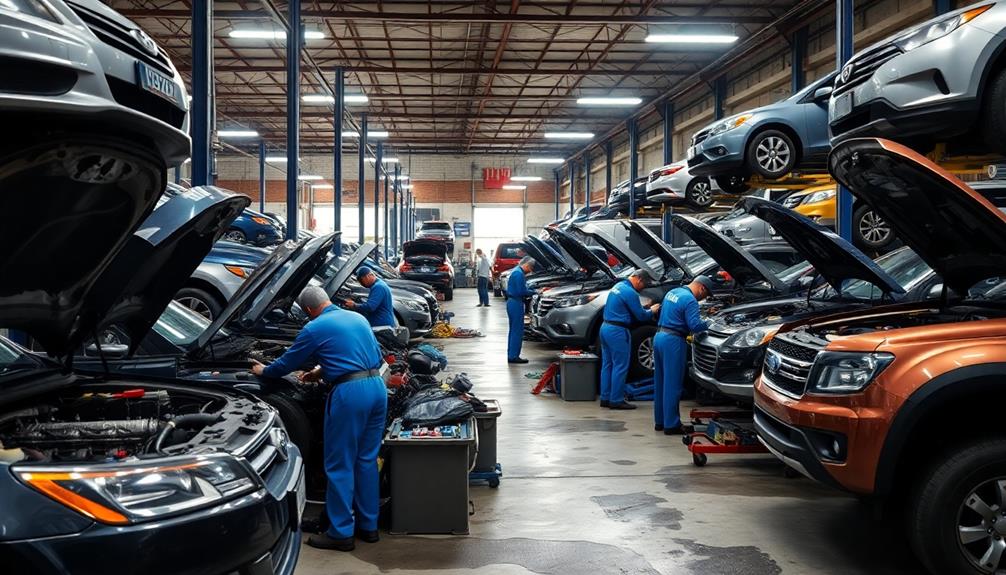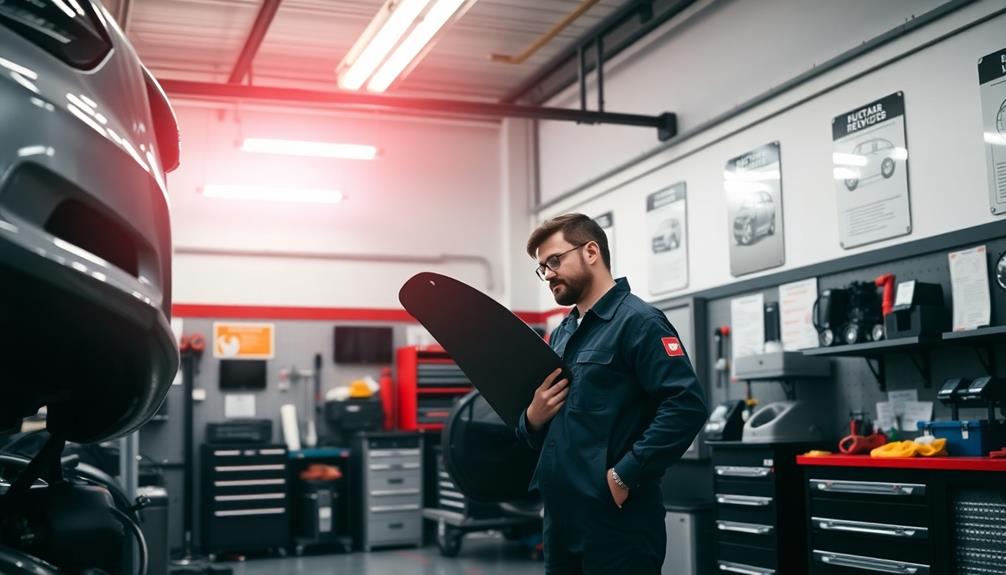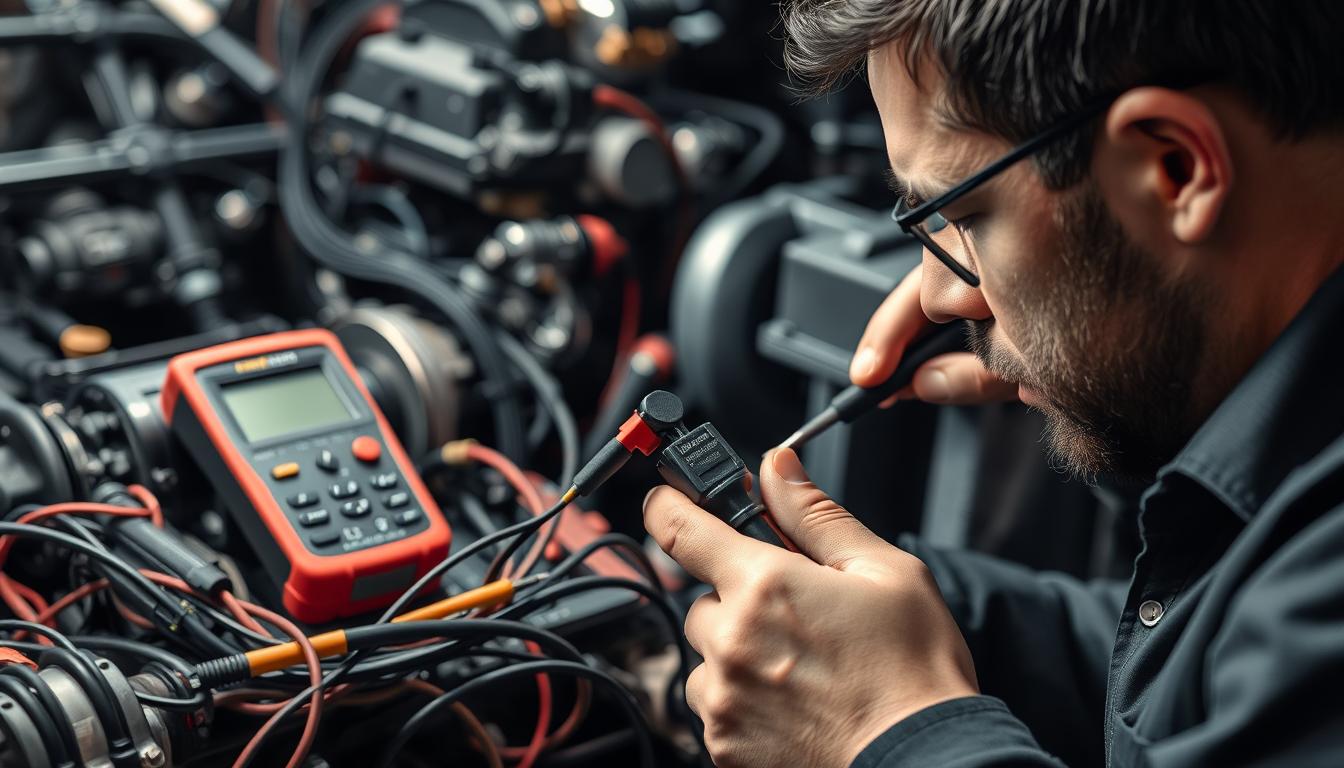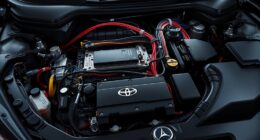General automotive repair covers the diagnosis, maintenance, and repair of your vehicle's mechanical and electrical systems. You'll find it includes essential tasks like oil changes, brake inspections, and tire rotations. When issues arise, skilled technicians use advanced diagnostic tools to pinpoint problems, ensuring your car runs well. Regular maintenance prevents unexpected breakdowns and extends vehicle life while improving safety and fuel efficiency. It's vital to recognize signs your vehicle needs attention, such as warning lights or unusual noises. If you're curious about the specifics involved in general automotive repair, there's much more to explore.
Key Takeaways
- General automotive repair involves diagnosing, maintaining, and repairing mechanical and electrical systems in vehicles.
- Common services include routine maintenance tasks like oil changes, brake inspections, and tire rotations.
- Diagnostic tools are used to identify issues within onboard computer systems and specific vehicle components.
- Regular maintenance prevents unexpected breakdowns and enhances vehicle reliability and performance.
- Professional repairs ensure skilled technicians address complex problems, providing safety and extending vehicle lifespan.
Definition of General Automotive Repair
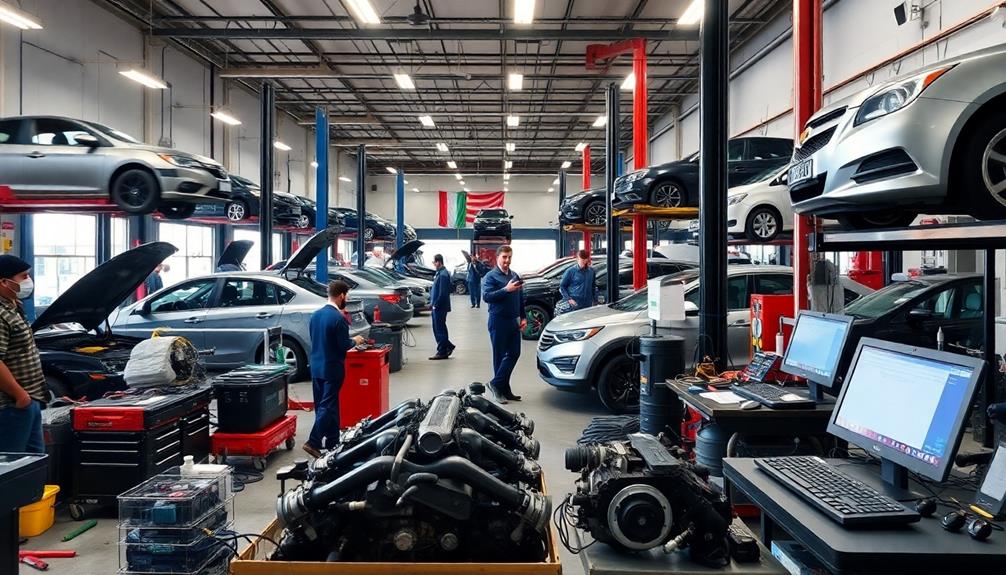
General automotive repair is essential for keeping vehicles running smoothly and safely. It encompasses a wide range of services designed to diagnose, maintain, and repair both mechanical and electrical systems in your vehicle.
When you think of general auto services, routine maintenance tasks come to mind, such as oil changes, tire rotations, and brake inspections. These tasks are critical for ensuring peak vehicle performance and safety.
Diagnostic services play an important role in automotive repair. Technicians use advanced tools to identify issues within a vehicle's onboard computer systems, allowing them to pinpoint exact problems efficiently. This precision helps you avoid more significant issues down the road.
Repair services address specific faults, from engine and transmission repairs to brake and suspension system overhauls. These tasks often require specialized skills and knowledge, ensuring that your vehicle receives the best care possible.
Additionally, the industry adheres to strict regulatory compliance regarding safety standards and technician certifications, making sure you get quality service. By understanding the definition of general automotive repair, you can appreciate its significance in maintaining your vehicle's reliability and performance.
Common Types of Repairs
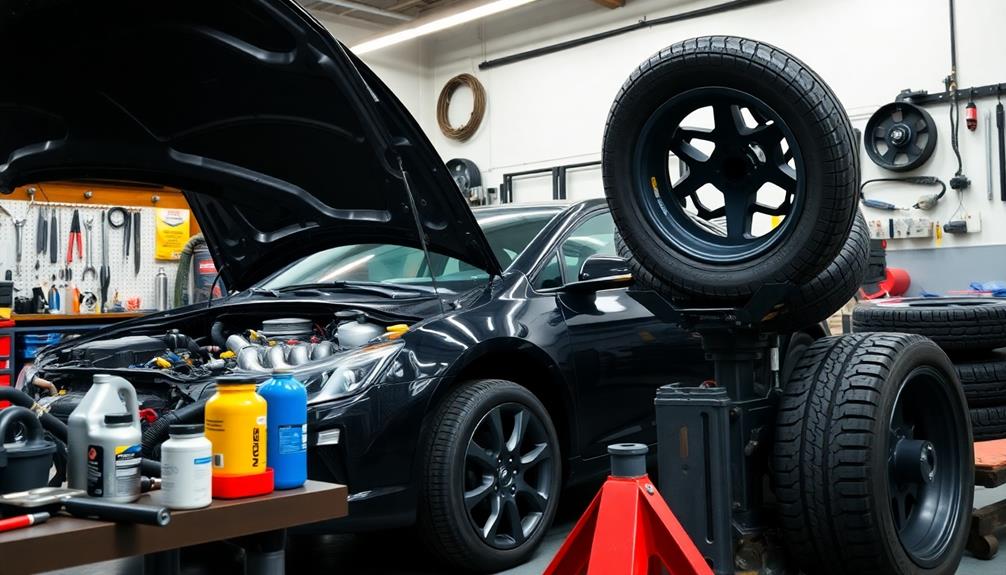
Maintaining your vehicle involves addressing various common types of repairs that can arise over time.
One of the most frequent issues is oil changes. If you notice pools of oil under your vehicle, you might've an oil leak, which can lead to serious engine damage if not fixed promptly.
Brake repair is another critical aspect of vehicle maintenance. If your brake pedal feels soft, you hear squeaking noises, or your car pulls to one side, it's time to get your brakes inspected.
Tire repairs are also common. Issues like slow leaks or punctures can often be patched rather than replaced, saving you money while keeping your tires in good shape.
Lastly, don't overlook fuel injection repairs. If your engine is misfiring or you're experiencing reduced fuel efficiency, it may be time to address problems with your fuel injectors to maintain peak performance.
Importance of Regular Maintenance
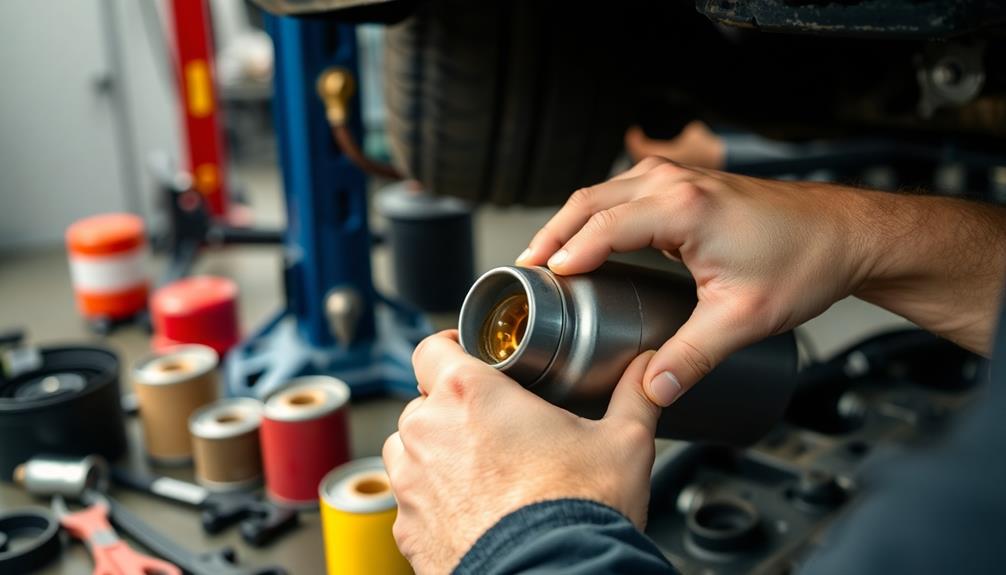
Regular maintenance is essential for keeping your vehicle running smoothly and safely. By committing to regular maintenance, you can avoid the stress of unexpected breakdowns and guarantee your vehicle remains in top shape.
Preventive maintenance, like oil changes and tire rotations, helps extend your vehicle's lifespan while preventing costly repairs down the road.
Consider the benefits of staying on top of your vehicle's upkeep:
- Enhanced safety through timely brake and fluid inspections
- Improved fuel efficiency, saving you hundreds annually
- Preserved warranty coverage by following the owner's manual
- Increased resale value with documented service history
- Identification of minor issues before they escalate
For vehicle owners, regular maintenance isn't just about keeping the car running; it's about peace of mind. Knowing your vehicle is safe and reliable allows you to focus on enjoying the journey.
By prioritizing preventive maintenance, you can address small problems before they turn into major headaches. Don't wait for a costly repair to remind you of the importance of routine check-ups.
Keep your vehicle in great condition and protect your investment with regular maintenance.
Key Diagnostic Tools Used
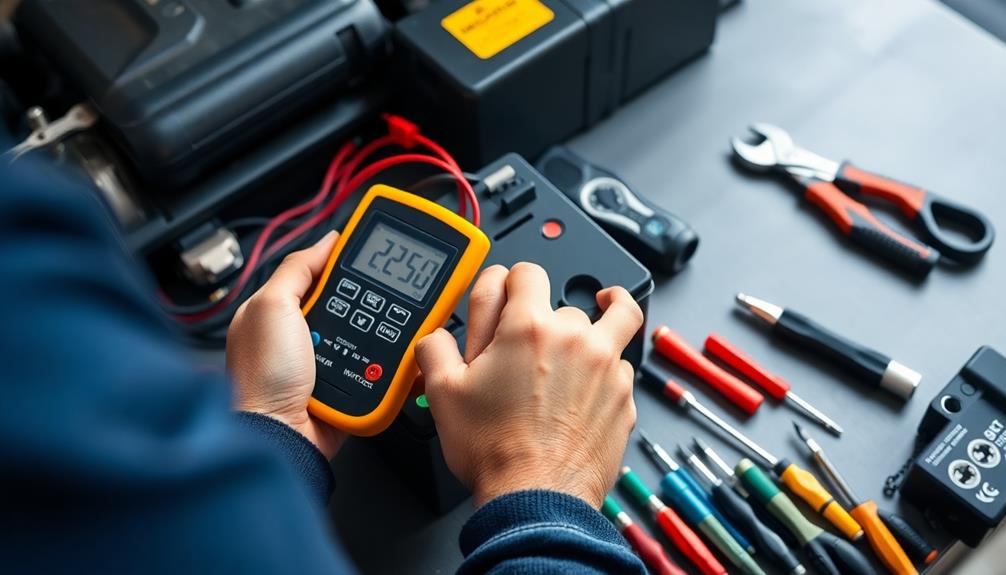
When it comes to diagnosing automotive issues, having the right tools is essential.
Diagnostic scan tools connect to your vehicle's computer to pull error codes, while pressure testing equipment helps you check for leaks and guarantee systems are functioning properly.
Understanding how to use these tools can save you time and lead to more accurate repairs.
Diagnostic Scan Tools
In the world of automotive repair, diagnostic scan tools play a pivotal role in identifying and resolving vehicle issues. As an automotive technician, you rely on these essential devices to communicate with a vehicle's onboard computer systems and retrieve error codes related to both mechanical and electronic problems.
With support for protocols like OBD-II, these tools allow for standardized diagnostics across various vehicles, making them vital for repairs and emissions testing.
Here are some reasons why diagnostic scan tools are invaluable:
- They provide real-time data, including sensor readings and performance metrics.
- Freeze frame data captures specific vehicle conditions at the moment a fault occurs.
- Advanced features enhance accuracy in pinpointing issues.
- Integration with mobile apps and cloud services simplifies updates and data sharing.
- They empower you to troubleshoot more effectively and efficiently.
Pressure Testing Equipment
Pressure testing equipment is fundamental for diagnosing leaks in various automotive systems. By applying pressure and monitoring for drops, you can quickly identify issues in cooling, fuel, and exhaust systems. Common tools include pressure testers, vacuum testers, and smoke machines, each designed for specific tasks essential to vehicle maintenance.
For instance, a cooling system pressure tester lets you pressurize the system to check for leaks in hoses, radiators, and head gaskets. This proactive step helps prevent overheating and costly engine damage.
Similarly, fuel pressure testers confirm the fuel system meets manufacturer specifications, helping you diagnose fuel delivery and injection problems.
Smoke machines are particularly useful for visualizing leaks in vacuum systems, intake manifolds, and exhaust systems. They produce smoke that reveals hard-to-detect issues, enabling you to pinpoint problems effectively.
Incorporating these tools into your maintenance schedules is fundamental for keeping your vehicle in peak condition.
Finding a Qualified Mechanic

Finding a qualified mechanic can make all the difference in keeping your vehicle running smoothly. When you prioritize your vehicle's health, you guarantee safe travels and peace of mind.
Here are some effective ways to find a great mechanic:
- Ask friends, family, or coworkers for recommendations; personal referrals often lead to trustworthy options.
- Check online review platforms like Google Reviews and Yelp to gauge the reputation of different auto repair shops.
- Look for certifications from recognized organizations to evaluate a mechanic's qualifications.
- Visit the mechanic's website to assess professionalism and the quality of service they provide.
- Start with minor repairs or maintenance to test their work before diving into bigger repairs.
These steps help you feel confident in your choice.
Remember, finding a qualified mechanic is essential for your vehicle's long-term maintenance. You need someone who understands the importance of your vehicle's health and can provide reliable auto repair services.
Investing time in finding the right mechanic can save you from future headaches and keep your car in top shape.
Signs Your Vehicle Needs Repair
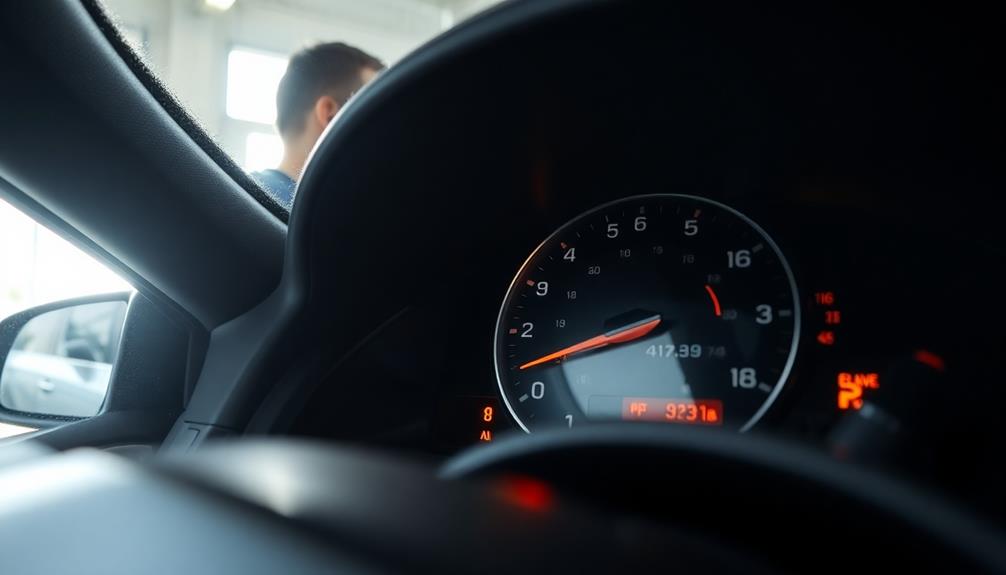
If you notice warning lights popping up on your dashboard, it's time to pay attention.
Unusual noises or vibrations while driving can signal that something's not right under the hood.
Ignoring these signs could lead to more serious issues down the road, so don't wait to get your vehicle checked out.
Warning Light Indicators
When warning lights illuminate your dashboard, they act as vital signals that your vehicle may need attention. Ignoring these indicators can lead to serious issues and jeopardize your vehicle's performance. One of the most common warning lights is the check engine light, which could mean anything from a minor sensor issue to a major engine problem.
Here are some other important warning lights to watch for:
- Oil pressure warning: Low oil pressure can cause engine damage.
- Battery warning: A failing alternator or battery can leave you stranded.
- Brake warning: Low brake fluid or worn pads can compromise your safety.
- Tire pressure warning: Insufficient tire pressure affects handling and fuel efficiency.
Each of these warning lights plays a key role in your car's maintenance. Neglecting them can lead to costly repairs or even dangerous situations on the road.
Always pay attention to what your dashboard is telling you, as timely action can guarantee your vehicle remains in top shape and maintains peak performance.
Don't wait until it's too late; keep up with your car maintenance and address those warning lights promptly!
Unusual Noises or Vibrations
Ignoring warning lights isn't the only way to overlook potential vehicle issues; unusual noises or vibrations can also signal that something's wrong. If you hear grinding, squeaking, or clunking sounds, it might indicate problems with your brake system, suspension, or engine components. Don't wait—get it checked out immediately!
Vibrations felt in the steering wheel or throughout your vehicle could suggest wheel alignment, tire balance, or suspension issues, affecting both handling and safety. A persistent humming or whining noise? That could mean failing wheel bearings or transmission problems, which need prompt attention to avoid further damage.
Take a look at the table below for common signs and what they might mean:
| Noise/Vibration | Possible Issue | Action Needed |
|---|---|---|
| Grinding or clunking | Brake or suspension issues | Immediate inspection |
| Steering wheel vibrations | Wheel alignment or tire balance | Alignment and balance check |
| Humming or whining | Failing wheel bearings or transmission | Prompt diagnostic |
Ignoring these signs can lead to severe mechanical failures and higher repair costs. Regular maintenance is essential for your vehicle's health!
Differences Between Repair and Maintenance

Understanding the differences between repair and maintenance is essential for every vehicle owner. Maintenance is about keeping your vehicle in top shape through regular, preventive tasks, while repairs come into play when something goes wrong.
Here are some key differences to keep in mind:
- Scheduled vs. As Needed: Maintenance is planned, while repairs are reactive to issues.
- Preventive vs. Reactive: Maintenance prevents breakdowns, whereas repairs fix existing problems.
- Routine vs. Specialized: Maintenance tasks, like oil changes, are straightforward, while repairs often require specialized skills for complex issues.
- Cost Predictability: Maintenance costs can be budgeted, but repair expenses can vary widely based on the issue.
- Impact on Vehicle Performance: Regular maintenance boosts your vehicle's performance and lifespan, while repairs aim to restore functionality.
Benefits of Professional Repairs
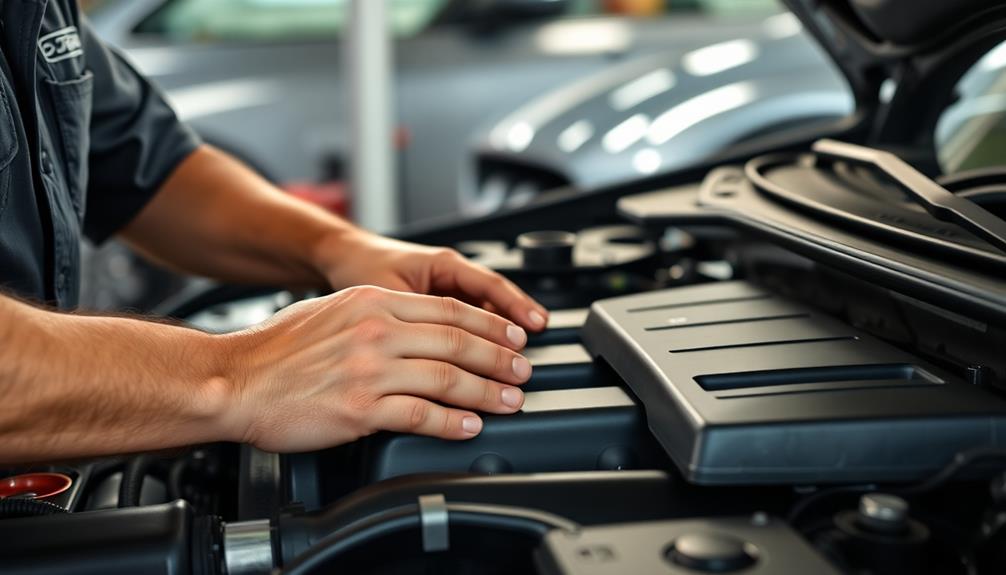
Choosing professional repairs for your vehicle offers numerous advantages that can enhance its overall performance and longevity. Skilled technicians have the expertise to accurately diagnose and address complex issues, reducing the likelihood of recurring problems. When you utilize advanced diagnostic tools, these professionals can identify underlying problems that mightn't be immediately apparent, leading to more effective and efficient repairs.
Another considerable benefit of professional repairs is the peace of mind that comes with warranties. These warranties protect you against future repair costs for the same issue, allowing you to focus on your driving instead of worrying about unexpected expenses.
Regular professional maintenance can extend the lifespan of your vehicle by promptly addressing wear and tear, ultimately saving you from costly replacements down the line.
Moreover, engaging professional services enhances safety. Critical systems, such as brakes and steering, are confirmed to be in ideal condition, greatly reducing the risk of accidents caused by mechanical failures.
Always refer to your owner's manual for recommended routine maintenance schedules, and remember that investing in professional repairs is a smart choice for both your vehicle's health and your safety on the road.
Frequently Asked Questions
What Is a General Automotive Mechanic?
A general automotive mechanic diagnoses and repairs various vehicle issues, ensuring your car runs smoothly. They utilize specialized tools, possess extensive knowledge of different models, and often hold certifications to confirm their skills and expertise.
What Is the Meaning of Automotive Repair?
Imagine your car's a trusted friend; automotive repair keeps it healthy and reliable. It involves routine checks and fixes, ensuring your vehicle's performance and safety, so you can hit the road with confidence. Regular maintenance is key to preventing costly breakdowns and extending your car’s life. When you visit a garage, automotive repair shop essentials like diagnostic tools, quality replacement parts, and skilled technicians play a crucial role in keeping everything in tip-top shape. With these resources at your disposal, you can be sure your vehicle is ready for any journey, no matter the distance.
What Does General Repairs and Maintenance Mean?
General repairs and maintenance mean keeping your vehicle in top shape. You're diagnosing issues, performing routine tasks like oil changes, and ensuring everything runs smoothly, which helps prevent larger problems down the road.
What Is the Meaning of General Mechanics?
Think of general mechanics as the heartbeat of your vehicle. It's the all-encompassing field where you diagnose, maintain, and repair various systems, ensuring your ride's safety, performance, and longevity through skilled hands and knowledge.
Conclusion
In the world of vehicles, think of general automotive repair as a skilled doctor for your car, diagnosing ailments and prescribing the right treatments. Just as you wouldn't ignore a persistent cough, you shouldn't overlook the signs your vehicle needs attention. By embracing regular maintenance and trusting qualified mechanics, you guarantee your car runs smoothly, much like a well-tuned orchestra. So, keep your automotive health in check, and your journey will be filled with harmony and adventure.
